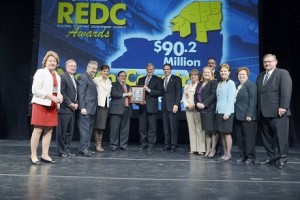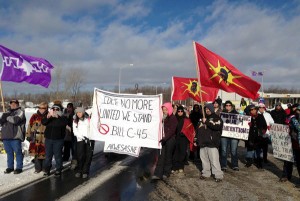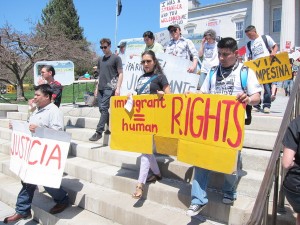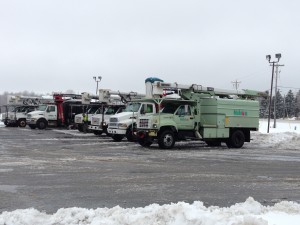2013: Top stories in a big year for the North Country

Politicians and economic development leaders join Governor Cuomo on stage in Albany. The North Country is the only region to win extra dollars each year of the program. Photo: Offfice of Gov. Cuomo
From ice storms to pipelines to protests, 2013 had it all. We’ve summarized the region’s biggest stories for you below. You can also see Brian Mann’s list of top Adirondack stories here. Behold, the year in review:
St. Lawrence Psychiatric Center saved: When the state Office of Mental Health announced it planned to close inpatient services at the mental health hospital in Ogdensburg, the local task force to save it went into high gear to save the services and hundreds of jobs in a city with few other options. Local leaders made their case to Governor Cuomo in person, arguing that it was too far for families to drive to Syracuse or Utica for help for their mentally ill children and adults. Cuomo bought their case, praised their efforts, and preserved most of the services in Ogdensburg, and went a step further to name the hospital a Center of Excellence for serving children with mental illnesses.
Navigating educational reform: The 2013-2014 school year marks the second year that New York state’s public schools are knee-deep in implementing rigorous Common Core standards, the optional curriculum that goes along with them, teacher evaluations that require additional testing, and data driven instruction. Debates about Common Core’s merits and drawbacks raged across New York state this fall, spurred in part by an an angry town hall meeting between state Education Commissioner John King and parents in Poughkeepsie. King cancelled town hall meetings across the state, then rescheduled them under pressure. He visited Schroon Lake and Plattsburgh in November. In Canton, educators say the state’s asking them to do more with fewer resources.

Bassmaster Elite angler Randy Howell reels in a small mouth during a 2013 practice session. But the fish are going to have to be about twice that size to win. Photo: David Sommerstein
Bassmasters in Waddington: 34,000 fans of professional bass fishing descended on the tiny St. Lawrence River village of Waddington to see their Bassmaster heroes weigh in during an Elite Series tournament. Students from Clarkson University estimated the events generated $1-3 million for the regional economy. Governor Cuomo made one of his visits to the North Country to celebrate landing the country’s top bass fishing event, although he disappointed some people when he announced the tournament will be held next year in the Finger Lakes.
The Greek Yogurt explosion: Even thought Governor Cuomo’s famed Yogurt Summit was held in 2012, this was the year several Greek yogurt plants opened or expanded, making New York the top producer of Greek yogurt in the country. The Cuomo Administration eased environmental regulations for dairy farms to expand – to the chagrin of many green groups – and offered grants for dairy farms to modernize and become more efficient to fill the need for more milk production in the state. It’s still unclear how many took the bait and how the Greek yogurt boom will affect New York’s dairy industry on a farm-by-farm basis.

Mohawks on Cornwall Island waited to march in support of the Idle No More movement. Photo: David Sommerstein.
Idle No More: At the very beginning of 2013, thousands of indigenous people protested and marched and did round dances across Canada – including on Cornwall Island on the Akwesasne Mohawk reserve – in support of Chief Therese Spence, who was engaged in a hunger strike on an island facing Parliament Hill in Ottawa. She was demanding better living conditions on aboriginal reserves and protesting a law that many say endangers native environmental resources for exploitation. The protests coalesced under the Idle No More hashtag that spread around the world through social media. Idle No More is aiming to usher in a new level of political and cultural engagement among savvy, vocal aboriginal young people demanding change in Canada.
A New Farm Bill – The Year’s Biggest Non-Story: After failing to pass a new five-year, $500 billion mega-bill at the end of 2012, Congress kicked the can down the road through all of 2013, and then failed again at the end of the year. The House took the unprecedented step of severing the urban-rural compromise that ensured the Farm Bill’s passage for decades: it removed the $80 billion food stamp program, the largest single item in the bill, from the farm subsidy and conservation programs. The conference committee negotiating differences between House and Senate versions of the bill say food stamps are now back in the package (although it’s unclear what the funding level will be), and they maintain they’re on track for passage of a new Farm Bill in early January 2014. The damage from all the delays? Not a whole lot, really. Congress passed extensions of the 2008 Farm Bill all this time.
Crises in the North Country’s health care system: From privatization of municipal nursing homes, to the emergency restructuring of EJ Noble Hospital in Gouverneur, the signs indicate the vast network of health care facilities in the region is at a financial tipping point. In early December, state Health Commissioner Dr. Nariv Shah appointed a new commission to deliver recommendations for improving preventive, medical, behavioral and long-term care from Glens Falls to Plattsburgh to Watertown. It’s to include recommendations for restructuring and capitalization, and identify merger and partnership possibilities and recommend distribution of re-investment grants…all by March 31.
F-35 Coming to Burlington: The Air Force announced in early December that 18 new F-35 fighter jets will head to the Vermont Air National Guard base at the Burlington Airport in 2020. The new, expensive plane will replace an aging fleet of F-16s. The F-35 has divided Burlington for years: Opponents say noise levels from the plane will adversely affect people who live near the airport, including children and minority populations. Supporters say the plane will keep the Air Guard in the area, provide jobs and spur economic growth. Even though the Air Force says the decision is final, opponents have pledged to keep fighting.
VT passes two major new laws: In 2013 Vermont became the fourth state to legalize physician assisted suicide – or, as supporters call it, death with dignity. Vermont also passed a law granting drivers’ licenses to migrant workers. It’s the sixth state in the U.S. to do so. Farms in Vermont and northern New York have faced a major labor shortage, which means that migrant laborers from Mexico and Guatemala are now milking many of the region’s cows.
Gas pipeline from VT to NY: Early in 2013, Vermont Gas released a plan for a pipeline that would bring natural gas to Addison County, part of a larger plan to supply natural gas to Rutland. The proposed pipeline would run through Addison County and then go under Lake Champlain, supplying the International Paper mill in Ticonderoga, New York. The plan pitted environmentalists and property owners against those who hoped to take advantage of cheaper heating costs with natural gas. A number of public hearings and meetings took place in 2013. On December 23rd, the Vermont Public Service Board approved construction of phase one of the project, which will bring natural gas to Monkton, Ferrisburgh, Vergennes, New Haven, Bristol, Middlebury, and East Middlebury. They have not yet approved phase 2, the portion of the pipeline under Lake Champlain.
Sailing vegetable barge gets lots of press: Eric Andrus, a Vermont farmer and now, boat builder, spent 2013 building a sailing barge in his barn. This past fall he delivered Champlain Valley produce to New York City, carbon-free. Read more about Andrus’ journey here, here, and here.
Rain Reigns in St. Lawrence County: Former Public Defender Mary Rain ousted county District Attorney Nicole Duvé, despite questions about her ability to work well with others and persevere in a high-pressure job with an overwhelming workload. Rain raised enough questions about Duvé’s management practices and her handling of high-profile murder cases to win the office in a close and bitterly contested race. Rain was sworn in as DA over the weekend.
Christmas Ice Storm: More than inch of ice collapsed trees and power lines, and made it near impossible for many people to get to their holiday celebrations. More than 40,000 customers were in the dark in Jefferson and St. Lawrence counties alone in the lead-up to Christmas. An injection of 2,000 line crews from across the Northeast restored power with impressive speed, but still more than a thousand people in northern New York spent Christmas Eve or Christmas Day in the dark.







.jpg)


I’ve always objected to the all the anti-immigrant scapegoating going on. But that said, I’ve heard the arguments in favor of granting drivers licenses to undocumented workers and it’s never made any sense to me.
I’m ok with them being able to access health care… public health affects everyone. But how does it make sense to say they can drive here legally but they can’t be here legally?
Brian – I think it is a safety issue. They are here working and probably driving to work like anyone else. Might as well license them like anyone else. Make sure they have insurance etc.